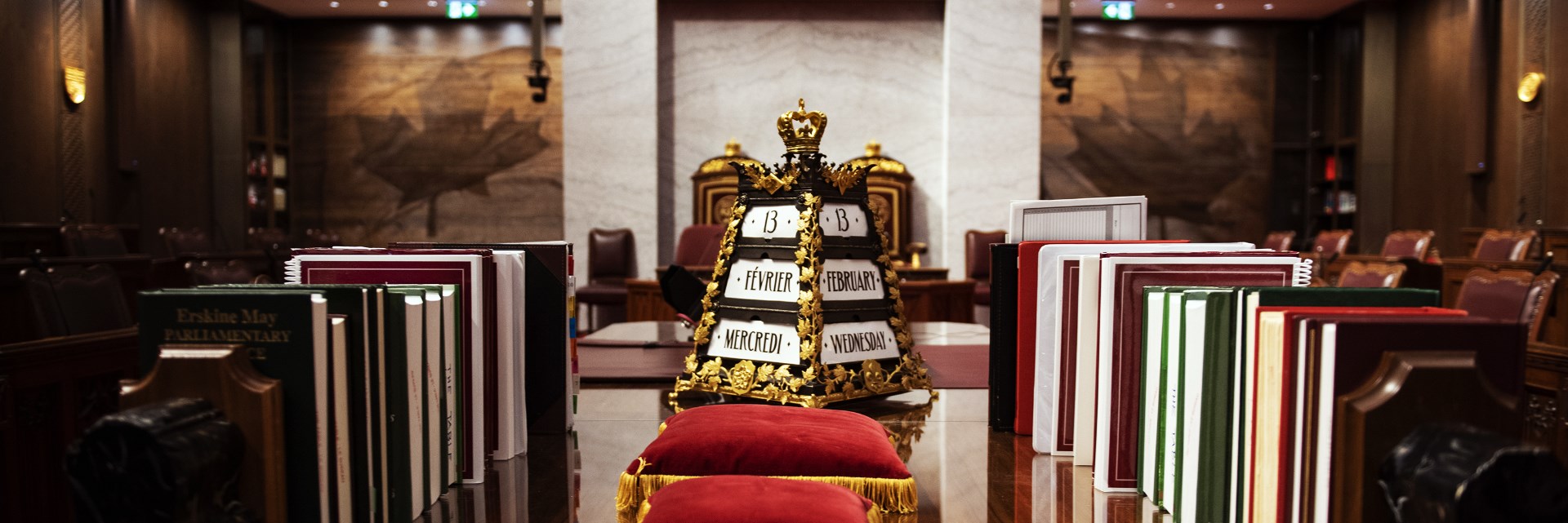NUMBER 14
LEAVE OF THE SENATE
Introduction
The Senate sometimes chooses to suspend or modify provisions of its Rules to allow something that would otherwise not be permissible. The Senate may, for example, agree to waive the usual notice period in order to expedite an item of business, or agree to extend the speaking time granted to a senator during debate. Such variations can occur without notice if a request is made and no senator raises an objection. This agreement is referred to as “leave of the Senate”.
Definition and Purpose
Appendix I of the Rules defines leave as “[a]n agreement of the Senate, without dissent expressed, to take an action involving the suspension of a rule or usual practice without notice”. If any senator present objects to a request for leave, the normal rules and practices must be followed.
The Rules also specify that leave is required in certain cases. The following is a non-exhaustive list of actions for which leave must be sought:
- altering or waiving the notice period required to expedite an item of business (e.g., second reading of a bill now, later this day or at the next sitting; third reading of a bill now or later this day; immediately moving a motion that normally requires notice; considering a committee report now or later this day, etc.);
- extending a senator’s speaking time;
- extending the time for Senators’ Statements;[i]
- varying from the normal order of business (e.g., bringing forward an item, calling an item again, reverting to Routine Proceedings, etc.);
- tabling papers during Tabling of Documents, if the senator is not the Leader or Deputy Leader of the Government[ii], or tabling papers during debate;[iii]
- adjourning the debate on an item of Other Business in a senator’s name if that senator has already spoken at an earlier sitting or adjourned the debate for the balance of his or her time;
- withdrawing an item already under debate7;[iv]
- reducing the normal duration of bells before a standing vote, following a proposal from the whips;[v]
- withdrawing or changing a senator’s vote after the announcement of results;[vi] and
- allowing a senator to speak a second time in a debate to provide clarifications.[vii]
Process
Requesting Leave
Pursuant to the Rules, a senator who seeks leave should state the rule or part of the rule to be suspended and provide an explanation.[viii] The senator may be asked to provide additional clarifications before a decision is made.
Granting Leave
The Speaker’s role is to ensure that there is no dissenting voice. When a request for leave is made, the Speaker asks all senators present if leave is granted. If even one senator is heard to object, leave is not granted and the Rules and normal practices must be observed. If no senator is heard to object, leave is granted. The Speaker may ask the question again if the response was unclear.
Effects
The granting of leave does not necessarily dispose of the item; the leave relates to the process (e.g., can the normal notice period be waived?), not the substance of the matter being raised for decision (e.g., should a particular debatable motion be adopted?).
For instance, in the case of a non-debatable procedural motion, (e.g., to place the consideration of a motion or the second reading of a bill on the Orders of the Day for later this day), the grant of leave indicates the Senate’s acceptance of the procedural motion (i.e., deciding when the debate will occur). The substantive question (e.g., should the motion be adopted? should the bill be read a second time?) must still be put to the Senate in the normal manner, with the opportunity for senators to engage in debate, propose amendments or even adjourn the debate on the matter if they so wish.
When leave is granted, that fact is recorded in the Journals of the Senate. However, a decision reached with leave does not constitute a binding precedent as such variations from the Rules and regular practices are decided on a case-by-case basis.
Limitation
The Rules of the Senate prohibit a request for leave to extend Tributes.[ix]
For additional information on leave of the senate
Senate Procedure in Practice (Chapter 5, p. 93)
For additional information on other points covered in this note
Senate Procedural Note No. 2, Order of Business of Sittings
Senate Procedural Note No. 3, Debate
Senate Procedural Note No. 4, Voting
Senate Procedural Note No. 5, Legislative Process
Senate Procedural Note No. 9, The Speaker of the Senate
Senate Procedural Note No. 13, Chamber Documents
References
[i] Rule 4-2(8)(a).
[ii] Rule 14-1(3).
[iii] Rule 14-1(4).
[iv] Rule 5-10(1).
[v] Rule 9-5.
[vi] Rule 9-7(2).
[vii] Rule 6-2(2).
[viii] Rule 1-3(2).
[ix] Rule 4-3(3).

